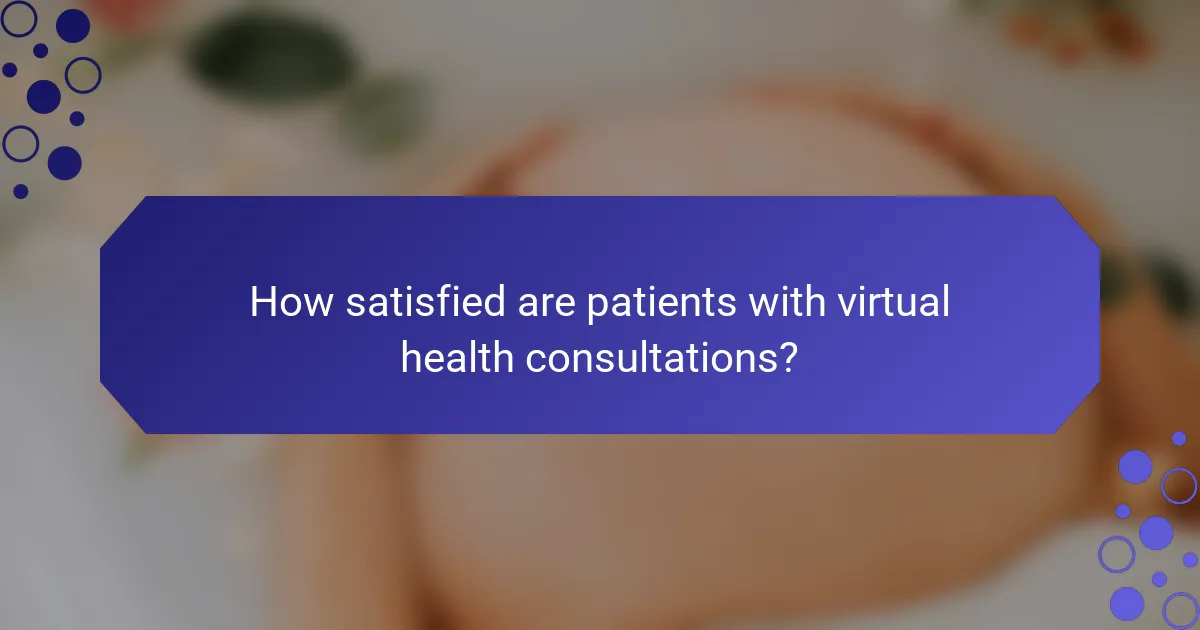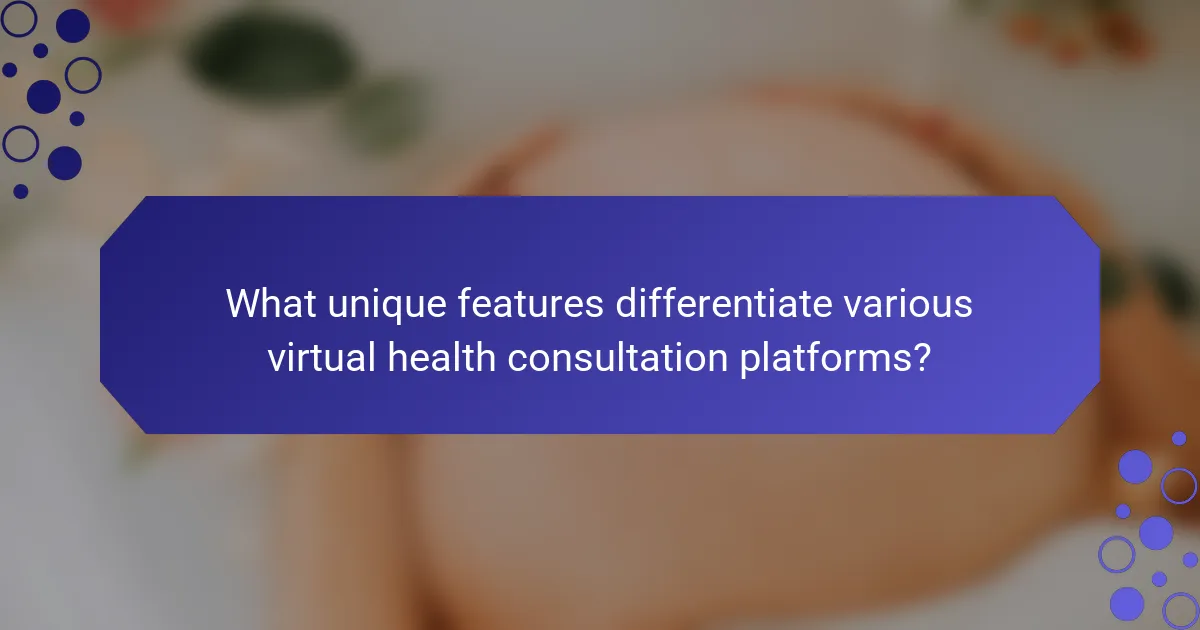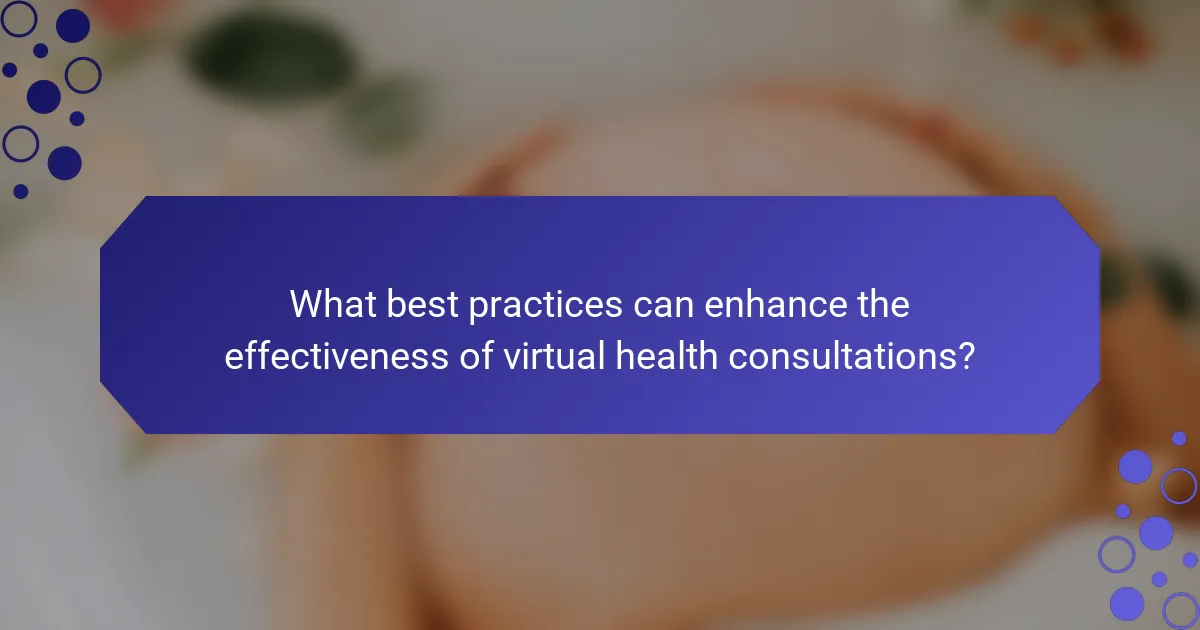Virtual health consultations provide significant advantages such as convenience, accessibility, and cost-effectiveness. Patient satisfaction is notably high due to reduced travel time and the comfort of consulting from home. However, challenges like technology issues and privacy concerns persist. Future trends indicate advancements in AI and increased telehealth adoption will further enhance the virtual consultation experience.

What are the key advantages of virtual health consultations?
Virtual health consultations offer several key advantages, including convenience, accessibility, and cost-effectiveness. Patients can consult healthcare providers from the comfort of their homes, reducing travel time and associated expenses. This mode of care also improves access for individuals in remote areas or those with mobility challenges. Studies indicate that patient satisfaction is higher with virtual consultations due to the flexibility they provide. As a result, virtual health consultations are likely to remain a significant trend in healthcare delivery.
How do virtual consultations improve accessibility for patients?
Virtual consultations significantly enhance accessibility for patients by eliminating geographical barriers and reducing wait times. Patients can connect with healthcare providers from their homes, making it easier to receive timely care. This model particularly benefits those in rural areas or with mobility challenges. Additionally, virtual consultations can accommodate various schedules, increasing the likelihood of attending appointments. As a result, patient satisfaction tends to improve due to the convenience and flexibility offered by these services.
What cost benefits do virtual health consultations offer?
Virtual health consultations offer significant cost benefits, including reduced travel expenses and lower overhead for healthcare providers. Patients save time and money by avoiding transportation and associated costs. Providers can minimize facility expenses, leading to more affordable services. Additionally, virtual consultations often streamline administrative processes, reducing operational costs. As a result, both patients and providers experience enhanced financial efficiency.
How do virtual consultations enhance patient engagement?
Virtual consultations significantly enhance patient engagement by providing convenience and personalized communication. Patients can access healthcare from their homes, which increases participation in their care. This approach fosters a more active role in health management, leading to higher satisfaction levels. Additionally, virtual platforms often incorporate features like reminders and educational resources, further encouraging patient involvement. The unique attribute of real-time interaction allows for immediate feedback, enhancing the overall experience.
What role does technology play in virtual health consultations?
Technology enhances virtual health consultations by improving accessibility, convenience, and patient engagement. Telemedicine platforms facilitate real-time communication, enabling patients to connect with healthcare providers from home. This reduces travel time and expands access to specialists. Furthermore, digital tools like patient portals enhance information sharing, increasing patient satisfaction. Future trends indicate a rise in artificial intelligence integration, which can personalize care and streamline administrative tasks.

How satisfied are patients with virtual health consultations?
Patients generally report high satisfaction with virtual health consultations. A survey indicated that 75% of patients felt their needs were met effectively through virtual visits. Convenience is a primary factor driving satisfaction, as patients appreciate reduced travel time and increased access to specialists. Additionally, many express comfort in discussing health issues from home, contributing to a positive experience. Future trends suggest that satisfaction may further increase with advancements in technology and wider adoption of telehealth services.
What factors contribute to patient satisfaction in virtual consultations?
Several factors contribute to patient satisfaction in virtual consultations, including effective communication, convenience, and technology reliability. Clear communication fosters trust and understanding between patients and healthcare providers. Convenience allows patients to access care from home, reducing travel time and associated stress. Additionally, reliable technology ensures smooth interactions, minimizing disruptions during consultations. These elements collectively enhance the overall patient experience in virtual health consultations.
How does patient satisfaction compare between virtual and in-person consultations?
Patient satisfaction tends to be higher in virtual consultations compared to in-person visits. A study showed that 85% of patients reported satisfaction with virtual visits, citing convenience and reduced travel time. In contrast, only 75% expressed similar satisfaction with in-person consultations. Factors influencing this include appointment flexibility and accessibility to healthcare providers. As telehealth evolves, patient preferences may further shift towards virtual options, emphasizing the importance of adapting to these trends.
What feedback do patients provide about their virtual consultation experiences?
Patients generally report high satisfaction with virtual consultations, citing convenience and accessibility as key advantages. Many appreciate the reduced travel time and the ability to receive care from home. Feedback often highlights the effectiveness of communication with healthcare providers. Some patients express concerns about technology issues and the lack of physical examination. Overall, virtual consultations are viewed positively, with many patients indicating a willingness to continue using this service.

What are the common challenges faced in virtual health consultations?
Common challenges in virtual health consultations include technology issues, lack of personal connection, and patient privacy concerns. These barriers can affect the overall effectiveness and satisfaction of the consultation experience. Technical difficulties, such as poor internet connectivity, can disrupt communication. Additionally, the absence of face-to-face interaction may hinder rapport building between patients and healthcare providers. Privacy concerns arise from the use of digital platforms, leading to apprehension about data security and confidentiality. Addressing these challenges is crucial for improving patient outcomes in virtual health consultations.
How do technical issues impact virtual health consultations?
Technical issues can significantly hinder virtual health consultations, affecting patient experience and satisfaction. Common problems include connectivity issues, software malfunctions, and user interface challenges. These disruptions can lead to miscommunication, delayed care, and increased frustration for both patients and providers. Moreover, technical difficulties may discourage patients from utilizing virtual consultations in the future, impacting overall adoption rates. Addressing these issues is crucial for enhancing the effectiveness and reliability of virtual health services.
What privacy and security concerns exist for patients during virtual consultations?
Privacy and security concerns for patients during virtual consultations include data breaches, unauthorized access, and lack of encryption. These issues can compromise sensitive health information, leading to identity theft and loss of patient trust. Ensuring secure platforms and compliance with regulations like HIPAA is essential for safeguarding patient data.

Which trends are shaping the future of virtual health consultations?
Virtual health consultations are increasingly shaped by technological advancements, patient preferences, and regulatory changes. Key trends include the rise of artificial intelligence for personalized care, increased demand for telehealth services post-pandemic, and a focus on data security and privacy. Additionally, integration with wearable devices enhances patient monitoring, while virtual reality offers innovative therapeutic options. These elements collectively improve accessibility, patient satisfaction, and overall healthcare outcomes.
How is artificial intelligence being integrated into virtual health consultations?
Artificial intelligence enhances virtual health consultations by improving diagnosis accuracy and personalizing patient care. AI tools analyze patient data to provide tailored recommendations, which increases efficiency and satisfaction. For example, chatbots assist in preliminary assessments, allowing healthcare providers to focus on complex cases. This integration promotes a more streamlined healthcare experience, potentially reducing wait times and improving outcomes. As AI technology advances, its role in virtual health consultations is expected to grow, shaping future trends in telemedicine.
What emerging technologies are influencing the future of telehealth?
Emerging technologies significantly enhance telehealth by improving virtual health consultations. Key innovations include artificial intelligence for diagnostics, remote monitoring devices, and secure communication platforms. These advancements increase patient satisfaction by providing timely access to healthcare and personalized treatment options. As a result, telehealth is expected to grow, with projections estimating a market value of $459.8 billion by 2030.
How are regulatory changes affecting virtual health consultations?
Regulatory changes are enhancing virtual health consultations by increasing accessibility and improving patient data protection. Recent legislation promotes telehealth reimbursement, encouraging providers to offer these services. As a result, patient satisfaction is rising due to convenience and reduced travel barriers. Future trends indicate a continued focus on integrating technology while ensuring compliance with evolving regulations.

What unique features differentiate various virtual health consultation platforms?
Various virtual health consultation platforms differ in features such as user interface, appointment scheduling, and integration with health records. These unique attributes enhance patient experience and satisfaction. Platforms may offer real-time video consultations, chat options, and prescription services, catering to diverse patient needs. Some platforms emphasize data security, while others focus on user-friendly designs, making them appealing to specific demographics.
Which platforms are leading in user experience and functionality?
Leading platforms in virtual health consultations prioritize user experience and functionality, including Teladoc, Amwell, Doxy.me, Zocdoc, MDLive, and Doctor on Demand. These platforms provide seamless navigation, high-quality video consultations, and integrated scheduling features. User satisfaction ratings highlight the importance of intuitive interfaces and responsive support services. Emerging trends focus on enhancing accessibility and personalization, ensuring a more tailored patient experience.
How do different platforms address specific patient needs?
Different platforms address specific patient needs by offering tailored features and services. Telehealth platforms often provide 24/7 access to care, which enhances convenience for patients with varying schedules. Some platforms focus on specialized consultations, addressing unique health conditions like mental health or chronic illnesses, ensuring patients receive expert guidance.
User-friendly interfaces and mobile accessibility are common attributes, allowing patients to engage easily with healthcare providers. Additionally, platforms may integrate personalized health tracking tools, enhancing patient engagement and satisfaction. Future trends indicate a growing emphasis on artificial intelligence to further customize patient experiences, improving outcomes and efficiency in virtual health consultations.

What best practices can enhance the effectiveness of virtual health consultations?
To enhance the effectiveness of virtual health consultations, prioritize clear communication and patient engagement. Use secure technology to ensure privacy, and provide technical support to address any issues promptly. Regular feedback from patients can help refine the process. Additionally, utilizing video over audio can foster a stronger connection, improving overall satisfaction.
How can healthcare providers improve communication during virtual consultations?
Healthcare providers can improve communication during virtual consultations by employing clear protocols and utilizing technology effectively. Establishing a structured agenda helps focus discussions, while using visual aids enhances understanding. Regular feedback from patients can identify communication gaps. Training staff in digital communication fosters a supportive environment. Additionally, ensuring reliable technology minimizes disruptions and maintains engagement.
What strategies can patients use to prepare for a virtual consultation?
To prepare for a virtual consultation, patients should follow several strategies. First, ensure a stable internet connection to avoid disruptions. Next, gather relevant medical records and a list of current medications to share with the healthcare provider. Additionally, prepare questions to address specific health concerns, enhancing communication. Finally, choose a quiet, well-lit space for the consultation to facilitate a focused discussion.
What common mistakes should be avoided in virtual health consultations?
Common mistakes in virtual health consultations include poor communication, inadequate preparation, and lack of patient engagement. Failing to establish clear communication can lead to misunderstandings about symptoms and treatment plans. Inadequate preparation, such as not reviewing patient history, may hinder effective diagnosis. Lastly, neglecting to engage patients actively can reduce their satisfaction and adherence to treatment. Addressing these issues enhances the overall effectiveness and satisfaction of virtual health consultations.
